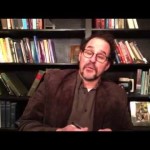We run our website the way we wished the whole internet worked: we provide high quality original content with no ads. We are funded solely by your direct support. Please consider supporting this project.

Three Arguments Against Determinism
There was an interesting article in the NY Times yesterday by John Tierney entitled “Do You Have Free Will? Yes, It’s The Only Choice.”
The article reviews research that suggests that everybody intuitively believes people are morally responsible only for actions they could have refrained from doing and that when people don’t believe they are free they tend to behave more unethically. Hence, if free will is in fact an illusion, it is an illusion that is hard wired into us and one that is extremely helpful, if not absolutely necessary, for ethical behavior. If you believe in God and yet deny the reality of free will, you have to wonder why the Creator would hard-wire us to be so thoroughly self-deceived. In any event, I thought I’d offer three other pragmatic arguments for free will along the lines covered in this article.
The Incoherence of Ordained Morality. I would argue that the association of moral responsibility and free will is not only deeply intuitive, as the article suggests, it is also logically necessary. That is, I would argue that denying the association of moral responsibility and free will results in incoherence. For example, when a Calvinist asserts something like: “God ordains that Satan does evil in such a way that God remains morally holy for ordaining Satan to do evil while Satan becomes morally evil for doing what the all-holy God ordained him to do,” I submit they are asserting something that is beyond counter-intuitive; it is utterly incoherent. For a concept to have meaning it must have some rooting in our experience, at least by analogy. A concept for which there is no analogy in our experience is a vacuous concept. Yet, after decades of asking, I have yet to find anyone who can provide an analogy by which we might give meaning to the concept of an agent being morally responsible for what God ordained them to do. (I develop this argument at length in response to Paul Helseth in Four Views of Divine Providence).
Determinism is Self-Refuting. If free will is an illusion and everything is predetermined, then the ultimate cause of why a person believes that free will is an illusion and everything is predetermined is that they were predetermined to do so. But it’s hard to see how a belief can be considered “true” or “false” when it is, ultimately, simply a predetermined event. The snow falling outside my window right now is due to the fact that preexisting conditions determined it to be so. But we wouldn’t say that the snowfall is “true” or “false.”
Refuting Determinism By Action. You know what a person truly believes by how they act more than by what they say, for we often think we believe something when in fact we don’t. (E.g. the husband who convinces himself he loves his wife even though he mistreats her, cheats on her, etc.). On this basis I’d like to suggest that everyone who deliberates believes in free will, even if they think they do not, for its impossible to deliberate without acting on the conviction that the decision is up to you to resolve. For example, I am this moment deliberating about what to work on when I finish this blog. Should I work on a peace essay for a book collection that is due at the end of this week or should I finish reading a book by Andrew Sullivan that I started two days ago? As I weigh the pros and cons of both possibilities, I cannot help but manifest my conviction that I genuinely could opt for either one of these alternatives and that it is up to me to decide which I will choose. In other words, I reveal a deep rooted conviction that I am free as I deliberate, and the same holds true for every deliberation anyone engages in. There simply is no other way to deliberate. People may sincerely think they believe in determinism, but they act otherwise, and must act otherwise, every time they deliberate. The great American philosopher Charles Pierce argued that a belief that cannot be consistently acted on cannot be true. If he’s right about this – and I believe he is – then determinism must be false.
Think about it,
Peace.
Category: General
Tags: Free Will, Predestination, Responding to Calvinism
Topics: Providence, Predestination and Free Will
Related Reading

How do you respond to 1 Timothy 1:9?
“[God] saved us and called us with a holy calling, not according to our works but according to his own purpose and grace. This grace was given to us in Christ Jesus before the ages began…” Compatibilists sometimes appeal to this verse to support the view that God determined who would (and thus who would…

How do you respond to Exodus 21:12–13?
“Whoever strikes a person mortally shall be put to death. If it was not premeditated, but came about by an act of God, then I will appoint for you a place to which the killer may flee.” Compatibilists sometimes argue that this passage shows that fatal accidents are acts of God. The Hebrew does not…

Confronting Divine Determinism
Part of the fallen human condition inclines us to shirk our moral responsibility and accept that everything is predetermined, whether by God, the gods, fate, or blind chance. Various forms of determinism have been prevalent in most primitive religions, in much ancient philosophy, in most forms of Islam and even, most surprisingly, in much traditional…

Free Will: What about “natural” evil? Was Hurricane Sandy a Free Agent?
What about natural evil? How does free will help to make sense of this? Greg reflects on the origins of sickness, natural disaster, animal suffering and so on. Hope you’re enjoying the series so far. There’s more to come!

A Video Introduction to Open Theism
Here’s a video clip on Open Theism from Greg’s sessions with Travis Reed with The Work of the People. What is Open Theism? Open Theists affirm that God knows all of reality perfectly, so Open Theism really is about the nature and content of the future. Does the future contain real possibilities? We have to wrestle with…

Podcast: Are We REALLY Free if God is Going to Ultimately Trump Our Choices?
Greg looks at the nature of freewill, specifically: how God’s promises constricts human free will. http://traffic.libsyn.com/askgregboyd/Episode_0070.mp3
